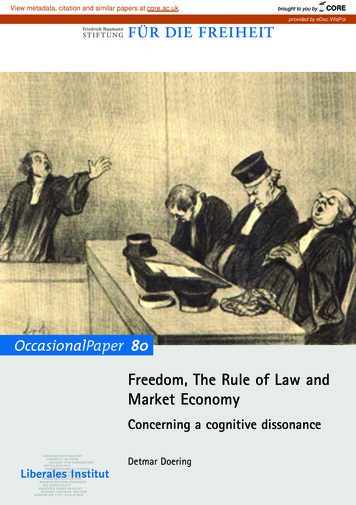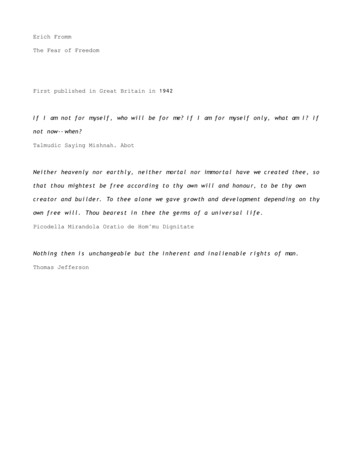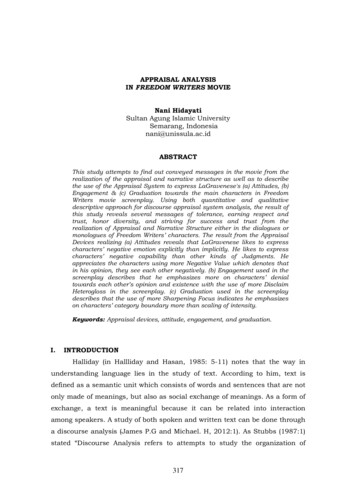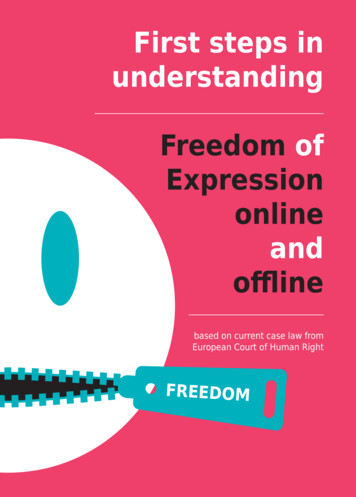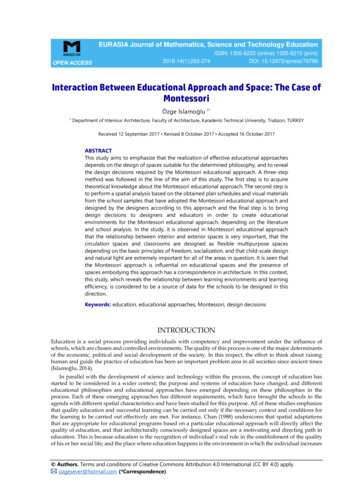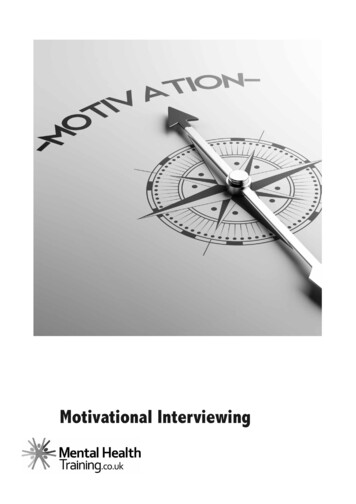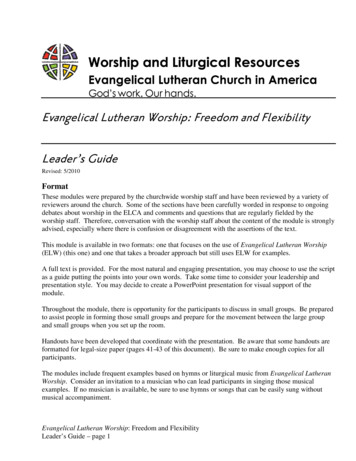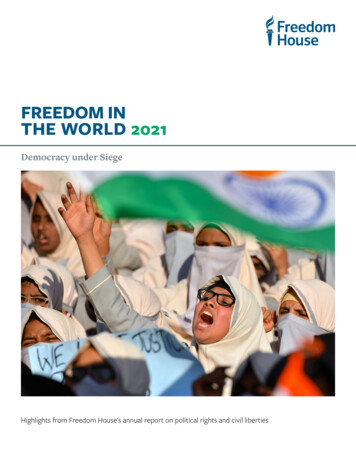
Transcription
FREEDOM INTHE WORLD 2021Democracy under SiegeHighlights from Freedom House's annual report on political rights and civil liberties
FREEDOM INTHE WORLD 2021TABLE OF CONTENTSDemocracy under Siege.1Freedom in the World 2021 Map.18Regional Trends. 20Countries in the Spotlight.27Policy Recommendations.28Freedom in the World Methodology.32This report was made possible by the generous support of the NationalEndowment for Democracy, the Merrill Family Foundation, and theLilly Endowment.Freedom House is solely responsible for the report’s content.The following people were instrumental in the writing of this booklet:Ever Bussey, Noah Buyon, Cathryn Grothe, and Tessa Weal. Elisha Aaron,David Meijer, Shannon O’Toole, and Tyler Roylance edited the report.This edition of Freedom in the World is dedicated to Arch Puddington, alifelong champion of democracy who retired in 2020 after serving for 26years as a mainstay of Freedom House’s research and analysis division.ON THE COVERThis booklet is a summary of findings for the 2021 edition ofFreedom in the World. The complete analysis including narrativereports on all countries and territories can be found on our websiteat www.freedomhouse.org.Muslim women demonstrateagainst India's discriminatorynew citizenship law in Bangalorein January 2020. Image credit:MANJUNATH KIRAN/AFP viaGetty Images
FREEDOM INTHE WORLD 2021Democracy under SiegeBy Sarah Repucci and Amy SlipowitzAs a lethal pandemic, economic and physical insecurity,and violent conflict ravaged the world in 2020,democracy’s defenders sustained heavy new losses in theirstruggle against authoritarian foes, shifting the internationalbalance in favor of tyranny. Incumbent leaders increasinglyused force to crush opponents and settle scores, sometimesin the name of public health, while beleaguered activists—lacking effective international support—faced heavy jailsentences, torture, or murder in many settings.These withering blows marked the 15th consecutive yearof decline in global freedom. The countries experiencingdeterioration outnumbered those with improvements by thelargest margin recorded since the negative trend began in2006. The long democratic recession is deepening.The impact of the long-term democratic decline has becomeincreasingly global in nature, broad enough to be felt bythose living under the cruelest dictatorships, as well as bycitizens of long-standing democracies. Nearly 75 percentof the world’s population lived in a country that faceddeterioration last year. The ongoing decline has given riseto claims of democracy’s inherent inferiority. Proponents ofthis idea include official Chinese and Russian commentatorsseeking to strengthen their international influence whileescaping accountability for abuses, as well as antidemocraticactors within democratic states who see an opportunity toconsolidate power. They are both cheering the breakdownof democracy and exacerbating it, pitting themselves againstthe brave groups and individuals who have set out toreverse the damage.The malign influence of the regime in China, the world’smost populous dictatorship, was especially profound in 2020.Beijing ramped up its global disinformation and censorshipcampaign to counter the fallout from its cover-up of theinitial coronavirus outbreak, which severely hampered arapid global response in the pandemic’s early days. Its effortsalso featured increased meddling in the domestic politicaldiscourse of foreign democracies, transnational extensions ofrights abuses common in mainland China, and the demolitionof Hong Kong’s liberties and legal autonomy. Meanwhile, theChinese regime has gained clout in multilateral institutionssuch as the UN Human Rights Council, which the UnitedStates abandoned in 2018, as Beijing pushed a vision ofso-called noninterference that allows abuses of democraticprinciples and human rights standards to go unpunished whilethe formation of autocratic alliances is promoted.As COVID-19 spread during the year, governments acrossthe democratic spectrum repeatedly resorted to excessivesurveillance, discriminatory restrictions on freedoms likemovement and assembly, and arbitrary or violent enforcementof such restrictions by police and nonstate actors.FreedomHouse.org1
FREEDOM INTHE WORLD 2021Democracy under SiegeA GROWING DEMOCRACY GAP: 15 YEARS OF DECLINECountries with aggregate score declines in Freedom in the World have outnumbered those with gains every year for thepast 15 years.2020DEMOCRACY GAPNUMBER OF COUNTRIES THAT IMPROVEDMINUS NUMBER OF COUNTRIES THAT DECLINED2009-33200820072005 2006 BER OF COUNTRIESTHAT IMPROVEDWaves of false and misleading information, generateddeliberately by political leaders in some cases, flooded manycountries’ communication systems, obscuring reliable dataand jeopardizing lives. While most countries with strongerdemocratic institutions ensured that any restrictions on libertywere necessary and proportionate to the threat posed by thevirus, a number of their peers pursued clumsy or ill-informedstrategies, and dictators from Venezuela to Cambodia exploitedthe crisis to quash opposition and fortify their power.The expansion of authoritarian rule, combined with thefading and inconsistent presence of major democracieson the international stage, has had tangible effects onhuman life and security, including the frequent resort tomilitary force to resolve political disputes. As long-standingconflicts churned on in places like Libya and Yemen, theleaders of Ethiopia and Azerbaijan launched wars lastyear in the regions of Tigray and Nagorno-Karabakh,respectively, drawing on support from authoritarianneighbors Eritrea and Turkey and destabilizing surroundingareas. Repercussions from the fighting shattered hopesfor tentative reform movements in both Armenia, which2@ FreedomHouseNUMBER OF COUNTRIESTHAT DECLINEDclashed with the Azerbaijani regime over Nagorno-Karabakh,and Ethiopia.India, the world’s most populous democracy, dropped fromFree to Partly Free status in Freedom in the World 2021.The government of Prime Minister Narendra Modi and itsstate-level allies continued to crack down on critics duringthe year, and their response to COVID-19 included a hamfisted lockdown that resulted in the dangerous and unplanneddisplacement of millions of internal migrant workers. Theruling Hindu nationalist movement also encouraged thescapegoating of Muslims, who were disproportionatelyblamed for the spread of the virus and faced attacks byvigilante mobs. Rather than serving as a champion ofdemocratic practice and a counterweight to authoritarianinfluence from countries such as China, Modi and his partyare tragically driving India itself toward authoritarianism.The parlous state of US democracy was conspicuous inthe early days of 2021 as an insurrectionist mob, egged onby the words of outgoing president Donald Trump and hisrefusal to admit defeat in the November election, stormed#FreedomInTheWorld
Freedom Housethe Capitol building and temporarily disrupted Congress’sfinal certification of the vote. This capped a year in whichthe administration attempted to undermine accountabilityfor malfeasance, including by dismissing inspectors generalresponsible for rooting out financial and other misconductin government; amplified false allegations of electoral fraudthat fed mistrust among much of the US population; andcondoned disproportionate violence by police in responseto massive protests calling for an end to systemic racialinjustice. But the outburst of political violence at the symbolicheart of US democracy, incited by the president himself,threw the country into even greater crisis. Notwithstandingthe inauguration of a new president in keeping with the lawand the constitution, the United States will need to workvigorously to strengthen its institutional safeguards, restoreits civic norms, and uphold the promise of its core principlesfor all segments of society if it is to protect its venerabledemocracy and regain global credibility.The widespread protest movements of 2019, which hadsignaled the popular desire for good governance the worldover, often collided with increased repression in 2020. Whilesuccessful protests in countries such as Chile and Sudanled to democratic improvements, there were many moreexamples in which demonstrators succumbed to crackdowns,with oppressive regimes benefiting from a distracted anddivided international community. Nearly two dozen countriesand territories that experienced major protests in 2019suffered a net decline in freedom the following year.Although Freedom in the World’s better-performingcountries had been in retreat for several years, in 2020 itwas struggling democracies and authoritarian states thataccounted for more of the global decline. The proportionof Not Free countries is now the highest it has been in thepast 15 years. On average, the scores of these countrieshave declined by about 15 percent during the same period.At the same time, the number of countries worldwideearning a net score improvement for 2020 was the lowestsince 2005, suggesting that the prospects for a change inthe global downward trend are more challenging than ever.With India’s decline to Partly Free, less than 20 percentof the world’s population now lives in a Free country, thesmallest proportion since 1995. As repression intensifies inalready unfree environments, greater damage is done to theirinstitutions and societies, making it increasingly difficult tofulfill public demands for freedom and prosperity under anyfuture government.The enemies of freedom have pushed the false narrative thatdemocracy is in decline because it is incapable of addressingpeople’s needs. In fact, democracy is in decline because itsA soldier in the TigrayRegion of Ethiopiawalks by a bank as itreopens in December2020, a month afteran armed conflicterupted in theregion. Image credit:EDUARDO SOTERAS/AFP via Getty ImagesFreedomHouse.org3
FREEDOM INTHE WORLD 2021Democracy under SiegeA SHIFTING INTERNATIONAL BALANCEIn 2020, the number of Free countries in the world reached its lowest level since the beginning of a 15-year period of globaldemocratic decline, while the number of Not Free countries reached its highest level.2005FREE8920102015878620208258PARTLY FREE60595954NOT FREE4547most prominent exemplars are not doing enough to protectit. Global leadership and solidarity from democratic states areurgently needed. Governments that understand the value ofdemocracy, including the new administration in Washington,have a responsibility to band together to deliver on itsbenefits, counter its adversaries, and support its defenders.They must also put their own houses in order to shore uptheir credibility and fortify their institutions against politiciansand other actors who are willing to trample democraticprinciples in the pursuit of power. If free societies fail to takethese basic steps, the world will become ever more hostile tothe values they hold dear, and no country will be safe fromthe destructive effects of dictatorship.The shifting international balanceOver the past year, oppressive and often violent authoritarianforces tipped the international order in their favor time andagain, exploiting both the advantages of nondemocraticsystems and the weaknesses in ailing democracies. In avariety of environments, flickers of hope were extinguished,4@ FreedomHouse50contributing to a new global status quo in which acts ofrepression went unpunished and democracy’s advocates wereincreasingly isolated.The Chinese Communist Party (CCP), faced with the dangerthat its authoritarian system would be blamed for coveringup and thus exacerbating the COVID-19 pandemic, workedhard to convert the risk into an opportunity to exertinfluence. It provided medical supplies to countries that werehit hard by the virus, but it often portrayed sales as donationsand orchestrated propaganda events with economicallydependent recipient governments. Beijing sometimes soughtto shift blame to the very countries it claimed to be helping,as when Chinese state media suggested that the coronavirushad actually originated in Italy. Throughout the year, the CCPtouted its own authoritarian methods for controlling thecontagion, comparing them favorably with democracies likethe United States while studiously ignoring the countries thatsucceeded without resorting to major abuses, most notablyTaiwan. This type of spin has the potential to convincemany people that China’s censorship and repression are a#FreedomInTheWorld
Freedom Houserecipe for effective governance rather than blunt tools forentrenching political power.Beyond the pandemic, Beijing’s export of antidemocratictactics, financial coercion, and physical intimidation have ledto an erosion of democratic institutions and human rightsprotections in numerous countries. The campaign has beensupplemented by the regime’s moves to promote its agendaat the United Nations, in diplomatic channels, and throughworldwide propaganda that aims to systematically alterglobal norms. Other authoritarian states have joined Chinain these efforts, even as key democracies abandoned alliesand their own values in foreign policy matters. As a result,the mechanisms that democracies have long used to holdgovernments accountable for violations of human rightsstandards and international law are being weakened andsubverted, and even the world’s most egregious violations,such as the large-scale forced sterilization of Uighur women,are not met with a well-coordinated response or punishment.In this climate of impunity, the CCP has run roughshod overHong Kong’s democratic institutions and international legalagreements. The territory has suffered a massive decline infreedom since 2013, with an especially steep drop since massprodemocracy demonstrations were suppressed in 2019 andBeijing tightened its grip in 2020. The central government’simposition of the National Security Law in June erased almostovernight many of Hong Kong’s remaining liberties, bringingit into closer alignment with the system on the mainland. TheHong Kong government itself escalated its use of the law early in2021 when more than 50 prodemocracy activists and politicianswere arrested, essentially for holding a primary and attemptingto win legislative elections that were ultimately postponed bya year; they face penalties of up to life in prison. In Novemberthe Beijing and Hong Kong governments had colluded to expelfour prodemocracy members from the existing LegislativeCouncil, prompting the remaining 15 to resign in protest.These developments reflect a dramatic increase in the costof opposing the CCP in Hong Kong, and the narrowing ofpossibilities for turning back the authoritarian tide.The use of military force by authoritarian states, anothersymptom of the global decay of democratic norms, was ondisplay in Nagorno-Karabakh last year. New fighting eruptedin September when the Azerbaijani regime, with decisivesupport from Turkey, launched an offensive to settle aterritorial dispute that years of diplomacy with Armenia hadfailed to resolve. At least 6,500 combatants and hundreds ofcivilians were killed, and tens of thousands of people werenewly displaced. Meaningful international engagement wasabsent, and the war only stopped when Moscow imposeda peacekeeping plan on the two sides, fixing in place theAzerbaijani military’s territorial gains but leaving many otherquestions unanswered.The fighting in Nagorno-Karabakh has had spillover effectsfor democracy. In addition to strengthening the rule ofAzerbaijan’s authoritarian president, Ilham Aliyev, the conflictthreatens to destabilize the government in Armenia. A rarebright spot in a region replete with deeply entrenchedauthoritarian leaders, Armenia has experienced tentativegains in freedom since mass antigovernment protestserupted in 2018 and citizens voted in a more reform-mindedgovernment. But Prime Minister Nikol Pashinyan’s capitulationin the war sparked a violent reaction among some opponents,who stormed the parliament in November and physicallyattacked the speaker. Such disorder threatens the country’shard-won progress, and could set off a chain of eventsthat draws Armenia closer to the autocratic tendencies ofits neighbors.Ethiopia had also made democratic progress in recentyears, as new prime minister Abiy Ahmed lifted restrictionson opposition media and political groups and releasedimprisoned journalists and political figures. However,persistent ethnic and political tensions remained. In July2020, a popular ethnic Oromo singer was killed, leadingto large protests in the Oromia Region that were marredby attacks on non-Oromo populations, a violent responseby security forces, and the arrest of thousands of people,including many opposition figures. The country’s fragilegains were further imperiled after the ruling party in theTigray Region held elections in September against the willof the federal authorities and labeled Abiy’s governmentillegitimate. Tigrayan forces later attacked a military base,leading to an overwhelming response from federal forcesand allied ethnic militias that displaced tens of thousands ofpeople and led to untold civilian casualties. In a dark sign forthe country’s democratic prospects, the government enlistedmilitary support from the autocratic regime of neighboringEritrea, and national elections that were postponed due tothe pandemic will now either take place in the shadow of civilconflict or be pushed back even further.In Venezuela, which has experienced a dizzying 40-pointscore decline over the last 15 years, some hope arose in2019 when opposition National Assembly leader JuanGuaidó appeared to present a serious challenge to theFreedomHouse.org5
FREEDOM INTHE WORLD 2021Democracy under SiegeLARGEST 10-YEAR DECLINESDramatic declines in freedom have been observed in every region of the world.-39Mali-31Turkey-30Tanzania-28Central African 14Serbia-13-40-35-30-25-20Comoros-12El Salvador-12Gabon-12Thailand-15Decline in Aggregate Score-11Poland-11Uganda-11United States-10Liechtenstein-10United Arab Emirates-10-50FREEPARTLY FREENOT FREE6@ FreedomHouse#FreedomInTheWorld
Freedom HouseA demonstratorholds the Venezuelanflag in front of a lineof police officersduring a protestin Caracas againstthe government ofNicolás Maduro inMarch 2020. Imagecredit: JonathanLanza/NurPhoto viaGetty Imagesrule of dictator Nicolás Maduro. The opposition namedGuaidó as interim president under the constitution, citingthe illegitimacy of the presidential election that keptMaduro in power, and many democratic governmentsrecognized his status. In 2020, however, as opponentsof the regime continued to face extrajudicial execution,enforced disappearances, and arbitrary detention,Maduro regained the upper hand. Tightly controlledNational Assembly elections went forward despite anopposition boycott, creating a new body with a ruling partymajority. The old opposition-led legislature hung on in aweakened state, extending its own term as its electorallegitimacy ebbed away.Belarus emerged as another fleeting bright spot in August,when citizens unexpectedly rose up to dispute the fraudulentresults of a deeply flawed election. Alyaksandr Lukashenka’srepressive rule had previously been taken for granted, butfor a few weeks the protests appeared to put him on thedefensive as citizens awakened to their democratic potentialdespite brutal crackdowns, mass arrests, and torture. Bythe start of 2021, however, despite ongoing resistance,Lukashenka remained in power, and protests, more limitedin scale, continued to be met with detentions. Political rightsand civil liberties have become even more restricted thanbefore, and democracy remains a distant aspiration.In fact, Belarus was far from the only place where the promiseof increased freedom raised by mass protests eventuallycurdled into heightened repression. Of the 39 countries andterritories where Freedom House noted major protests in2019, 23 experienced a score decline for 2020—a significantlyhigher share than countries with declines represented inthe world at large. In settings as varied as Algeria, Guinea,and India, regimes that protests had taken by surprise in2019 regained their footing, arresting and prosecutingdemonstrators, passing newly restrictive laws, and in somecases resorting to brutal crackdowns, for which they facedfew international repercussions.The fall of India from the upper ranks of free nations couldhave a particularly damaging impact on global democraticstandards. Political rights and civil liberties in the country havedeteriorated since Narendra Modi became prime minister in2014, with increased pressure on human rights organizations,rising intimidation of academics and journalists, and a spateof bigoted attacks, including lynchings, aimed at Muslims.The decline only accelerated after Modi’s reelection in 2019.Last year, the government intensified its crackdown onprotesters opposed to a discriminatory citizenship law andarrested dozens of journalists who aired criticism of the officialpandemic response. Judicial independence has also comeunder strain; in one case, a judge was transferred immediatelyFreedomHouse.org7
FREEDOM INTHE WORLD 2021Democracy under SiegeDASHED HOPESOver the past year, embers of hope were extinguished in countries and territories that once seemed poised to makedemocratic gains.BELARUSALGERIA-8Alyaksandr Lukashenkaretained power afterfraudulent elections bythrowing thousands ofprotesters in jail, wheretorture is commonplace.-2Authorities escalatedtheir campaign againstprodemocracy protesterswho had driven outauthoritarian leaderAbdelaziz Bouteflikain 2019.HONG KONGINDIAVENEZUELA-2Nicolás Maduro’srepressive regimeattempted to undercutthe democraticopposition’s legitimacythrough fraudulentlegislative elections.ETHIOPIAafter reprimanding the police for taking no action during riotsin New Delhi that left over 50 people, mostly Muslims, dead.In December, Uttar Pradesh, India’s most populous state,approved a law that prohibits forced religious conversionthrough interfaith marriage, which critics fear will effectivelyrestrict interfaith marriage in general; authorities have alreadyarrested a number of Muslim men for allegedly forcingHindu women to convert to Islam. Amid the pandemic thegovernment imposed an abrupt COVID-19 lockdown in thespring, which left millions of migrant workers in cities withoutwork or basic resources. Many were forced to walk acrossthe country to their home villages, facing various forms ofmistreatment along the way. Under Modi, India appears to haveabandoned its potential to serve as a global democratic leader,elevating narrow Hindu nationalist interests at the expense ofits founding values of inclusion and equal rights for all.To reverse the global shift toward authoritarian norms,democracy advocates working for freedom in their home8@ FreedomHouse-2Nascent democraticreforms were disruptedby a civil conflict in theTigray Region, whereegregious human rightsabuses have beenreported.-4The Hindu nationalistgovernment crackeddown on dissent, drivingthe world’s mostpopulous democracy intothe Partly Free category.-3Beijing imposed harshnew restrictions in a bidto smother prodemocracyprotests, and thegovernment postponedelections it was setto lose.countries will need robust solidarity from like-mindedallies abroad.The eclipse of US leadershipThe final weeks of the Trump presidency featuredunprecedented attacks on one of the world’s most visible andinfluential democracies. After four years of condoning andindeed pardoning official malfeasance, ducking accountabilityfor his own transgressions, and encouraging racist andright-wing extremists, the outgoing president openlystrove to illegally overturn his loss at the polls, culminatingin his incitement of an armed mob to disrupt Congress’scertification of the results. Trump’s actions went uncheckedby most lawmakers from his own party, with a stunningsilence that undermined basic democratic tenets. Only aserious and sustained reform effort can repair the damagedone during the Trump era to the perception and reality ofbasic rights and freedoms in the United States.#FreedomInTheWorld
Freedom HouseThe year leading up to the assault on the Capitol wasfraught with other episodes that threw the country intothe global spotlight in a new way. The politically distortedhealth recommendations, partisan infighting, shockinglyhigh and racially disparate coronavirus death rates, andpolice violence against protesters advocating for racialjustice over the summer all underscored the United States’systemic dysfunctions and made American democracyappear fundamentally unstable. Even before 2020, Trumphad presided over an accelerating decline in US freedomscores, driven in part by corruption and conflicts ofinterest in the administration, resistance to transparencyefforts, and harsh and haphazard policies on immigrationand asylum that made the country an outlier among itsGroup of Seven peers.But President Trump’s attempt to overturn the will of theAmerican voters was arguably the most destructive actof his time in office. His drumbeat of claims—withoutevidence—that the electoral system was ridden by fraudsowed doubt among a significant portion of the population,despite what election security officials eventually praisedas the most secure vote in US history. Nationally electedofficials from his party backed these claims, striking at thefoundations of democracy and threatening the orderlytransfer of power.Though battered, many US institutions held strong during andafter the election process. Lawsuits challenging the result inpivotal states were each thrown out in turn by independentcourts. Judges appointed by presidents from both partiesruled impartially, including the three Supreme Court justicesTrump himself had nominated, upholding the rule of law andconfirming that there were no serious irregularities in thevoting or counting processes. A diverse set of media outletsbroadly confirmed the outcome of the election, and civilsociety groups investigated the fraud claims and providedevidence of a credible vote. Some Republicans spokeeloquently and forcefully in support of democratic principles,before and after the storming of the Capitol. Yet it may takeyears to appreciate and address the effects of the experienceon Americans’ ability to come together and collectivelyuphold a common set of civic values.The exposure of US democracy’s vulnerabilities has graveimplications for the cause of global freedom. Rulers andpropagandists in authoritarian states have always pointedto America’s domestic flaws to deflect attention from theirown abuses, but the events of the past year will give themample new fodder for this tactic, and the evidence they citewill remain in the world’s collective memory for a long timeto come. After the Capitol riot, a spokesperson from theRussian foreign ministry stated, “The events in WashingtonA protestercarries a versionof the Belarusianflag favored bythe democraticopposition duringa demonstration inMinsk against thefraudulent August2020 presidentialelection. Imagecredit: SergeiBobylev\TASS viaGetty ImagesFreedomHouse.org9
FREEDOM INTHE WORLD 2021Democracy under SiegeUNITED STATES IN DECLINEOver the past 10 years, the United States' aggregate Freedom in the World score has declined by 11 points, placing it amongthe 25 countries that have suffered the largest declines in this period.942010The decline was drivenby several factors, including:2Political corruption and conflictsof interest2Lack of transparency in government2Punitive immigration and asylum policies11-point decline832020Note: The US received a score of 94 in the 2011 edition of Freedom in the World, covering the events of 2010. It received a score of 83 in the 2021 edition,covering 2020. All scores are on a scale of 0 to 100.show that the US electoral process is archaic, does not meetmodern standards, and is prone to violations.” Zimbabwe’spresident said the incident “showed that the US has nomoral right to punish another nation under the guise ofupholding democracy.”For most of the past 75 years, despite many mistakes, theUnited States has aspired to a foreign policy based ondemocratic principles and support for human rights. Whenadhered to, these guiding lights have enabled the UnitedStates to act as a leader on the global stage, pressuringoffenders to reform, encouraging activists to continue theirfight, and rallying partners to act in concert. After four yearsof neglect, contradiction, or outright abandonment underTrump, President Biden has indicated that his administrationwill return to that tradition. But to rebuild credibility in suchan endeavor and garner the domestic support necessaryto sustain it, the United States needs to improve its owndemocracy. It must strengthen institutions enough to surviveanother assault, protect the electoral system from foreign10@ FreedomHouseand domestic interference, address the structural rootsof extremism and polarization, and uphold the rights andfreedoms of all people, not just a privileged few.Everyone benefits when the United States serves as a positivemodel, and the country itself reaps ample returns from amore democratic wo
Freedom House is solely responsible for the report's content. The following people were instrumental in the writing of this booklet: Ever Bussey, Noah Buyon, Cathryn Grothe, and Tessa Weal. Elisha Aaron, David Meijer, Shannon O'Toole, and Tyler Roylance edited the report. This edition of Freedom in the World is dedicated to Arch Puddington, a

